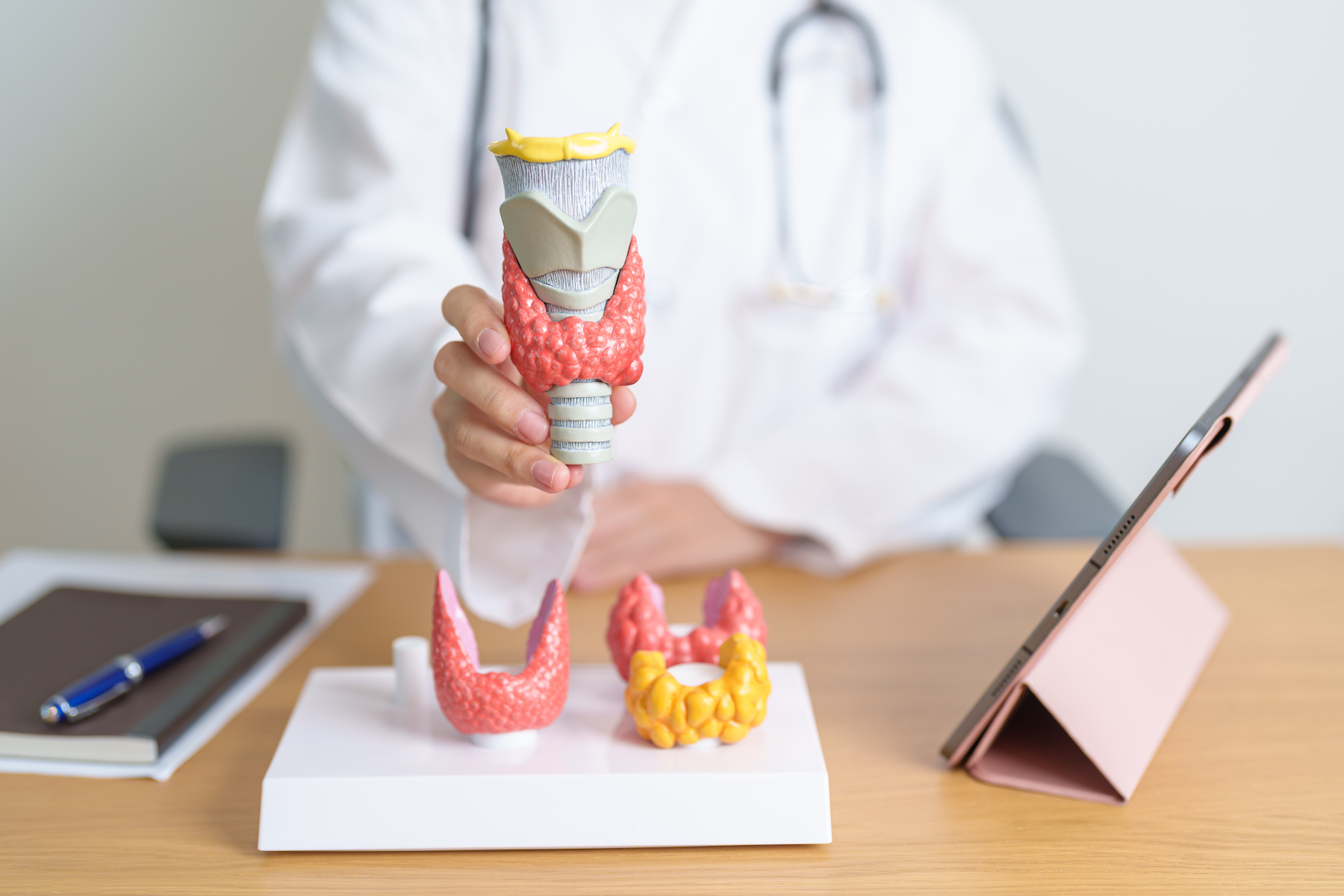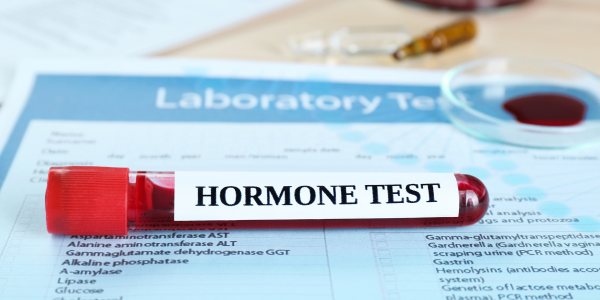

You’ve probably heard of hypothyroidism – maybe you even have it. But you may not have heard of Hashimoto’s. While it’s not exactly the same as hypothyroidism, it’s very similar in that it affects the thyroid gland. Let’s look at Hashimoto’s, find out how it’s diagnosed, and discover functional medicine treatments that can provide significant relief.
What is Hashimoto’s Thyroiditis?
Hashimoto’s thyroiditis is an autoimmune disease of the thyroid. What is the thyroid gland anyhow? And what does it do? The thyroid is a butterfly-shaped gland that sits right at the base of the neck under the Adam’s apple. It produces hormones like triiodothyronine (T3) and thyroxine (T4) that help regulate functions throughout the body. There are actually receptors for thyroid hormone in every cell of the body!
Hashimoto’s occurs when the immune system attacks healthy tissue in the thyroid, causing hormone producing cells to die and eventually a decrease in hormone production. Hashimoto’s is one of the ways you can develop hypothyroidism, which occurs when the thyroid doesn’t make enough thyroid hormone. In fact, Hashimoto’s is the most common cause of hypothyroidism in the United States.
Unfortunately, Hashimoto’s is fairly common, especially in women, with most women being diagnosed between the ages of 30 and 50. However, it can happen at any age, even teens and children. According to research, genetic and environmental factors play a role in Hashimoto’s. Thyroid specific genes and immunoregulatory genes contribute a genetic component, while lifestyle factors like nutrition, smoking, and infections contribute to environmental factors.
How Do You Diagnose Hashimoto’s?
Hashimoto’s is commonly diagnosed with lab work that shows elevated antithyroid peroxidase (TPO antibodies) and/or elevated thyroglobulin antibodies. These antibodies normally flag disease-causing foreign cells for the immune system to destroy. But in an autoimmune disease like Hashimoto’s, the immune system instead produces rogue antibodies that end up targeting healthy cells. This is why people with Hashimoto’s have these antibodies in their blood – their immune system is producing them to target proteins that are an important part of hormone production, leading to a decrease in hormone producing cells. Having higher concentrations of thyroid antibodies is correlated with actively having Hashimoto’s.
For some, a thyroid ultrasound may be necessary to look at the size of the gland and discover whether nodules, cysts, and/or inflammation signs are present. But for most, this may not be necessary and your provider will base the diagnosis – and treatment – on blood work.
Hashimoto’s Symptoms
At the start of the disease process, common symptoms of hyperthyroidism may occur including anxiety, difficulty concentrating, heat intolerance, and frequent bowel movements. But, once enough destruction occurs of the thyroid tissue, you may develop hypothyroid symptoms such as:
- Fatigue
- Exercise intolerance
- Muscle weakness
- Scaly, dry skin
- Decreased hair growth
- Constipation
- Cold intolerance
- Weight gain
- Fluid retention
- Depression
Hashimoto’s Treatment
Ultimately, Hashimoto’s is a lifelong disease with no “cure”, however it is possible for some to achieve remission. Hashimoto’s treatment options do exist that can provide symptom relief, and even lower thyroid antibodies.
For many that are hypothyroid (High TSH, Low T3/T4), treatment for Hashimoto’s begins with a thyroid medication like levothyroxine. This medication is T4 and converts to T3 in the body, which is the more active form of thyroid hormone. It’s taken daily, often in the morning on an empty stomach to improve absorption. However, there are many other options for thyroid medication. There are even many different types of levothyroxine (like Synthroid, Tirosint, generic levothyroxines, and compounded levothyroxine). There are also T3 medications, liothyronine, that can also be brand name like Cytomel, and generic like liothyronine, and compounded versions as well. In addition, it is possible to compound combinations of T4 and T3. And there are natural desiccated thyroid medications like NP Thyroid, NatureThroid, and Armour for example, that contain T4 and T3, and are derived from porcine thyroid gland, so they also contain other less known thyroid hormones T1 and T2, and other naturally occurring ingredients like calcitonin and iodine. Which medication works best for you is highly individualized.
But taking a thyroid medication isn’t the only option, and as a matter of fact, did you know that a lot of patients with Hashimoto’s do not even need thyroid medication? This is why it is important to personalize the treatment with your practitioner. Functional medicine offers a variety of Hashimoto’s treatment options, including finding and treating the root causes and triggers of Hashimoto’s and making diet and lifestyle changes accordingly.
Hashimoto’s Thyroiditis Diet
For those with Hashimoto’s, eating a gluten free diet is essential. In many clinical studies, gluten is associated with autoimmune diseases. A Paleo or Paleo autoimmune protocol (AIP) approach is also recommended because it helps to regulate the immune system.
What’s the difference between paleo or the paleo autoimmune approach (AIP)? While the AIP diet is very similar to the paleo diet, it’s often more stringent and involves eliminating certain foods, then reintroducing them gradually after symptoms improve. The focus of the AIP diet is nutrient-dense foods that help reduce inflammation, while removing gluten, legumes, nuts, eggs, dairy, and nightshade vegetables. After a period of elimination, reintroduction of foods happens gradually, based on tolerance and symptoms. On the other hand, the paleo diet contains similar foods like lean meats, fresh fruits and vegetables, nuts, and olive oil, though it isn’t as restrictive and doesn’t have a period of elimination.
While eating a gluten-free, paleo-based diet is usually best, there are other Hashimoto’s thyroiditis diet changes that can help. Increasing the level of protein intake and dietary fiber is important. Increasing unsaturated fats like olive oil, avocados, almonds, and pumpkin seeds can also be beneficial.
Address Vitamin and Nutrient Deficiencies
Among patients with Hashimoto’s, nutrient deficiencies can be common. Frequent nutrient deficiencies include:
- Iodine, which is necessary for proper thyroid gland functioning. But too much can also be a problem, causing damage to the thyroid just like too little iodine.
- Selenium is correlated with iodine, as one study found that selenium can reverse changes from excess iodine.
- Zinc. A common sign of zinc deficiency for those with Hashimoto’s is hair loss, which improves with zinc supplementation. In fact, zinc supplementation can support the thyroid in returning to normal thyroid function.
- Copper
- Iron
- Potassium
- Magnesium, which has anti-inflammatory properties and helps reduce the level of antibodies against the thyroid.
Vitamin deficiencies of vitamins A, D, C, and B vitamins are also frequent. Working with your functional medicine provider to address these deficiencies can help get to the root of your symptoms and support thyroid gland health.
Quality Sleep
Because hypothyroidism can cause sleep disturbances like insomnia, working to improve sleep hygiene is an important part of the functional medicine toolbelt. Studies show a correlation between untreated hypothyroidism and poor sleep quality. So, getting enough sleep is imperative! Not getting enough good quality sleep is a huge stress on the body, and high stress can impair immune function.
Ways to improve your sleep quality include:
- Getting enough sleep – aim for at least 7 hours each night
- Go to bed and wake up at the same time each day – even on the weekends!
- Avoid eating 2 hours before bed
- Avoid screen time and blue light exposure 1-2 hours before bed
- Keep your bedroom dark and cool
- Expose yourself to sunlight in the morning
Exercise
Exercise is a key part of any healthy lifestyle. Getting enough exercise with Hashimoto’s is no different. Along with the mood boosting benefits of exercise, it also helps boost your metabolism and fight fatigue. Exercise also supports a healthy immune system. But with lack of energy, it can be hard to get moving.
Find a way of moving your body that works for you and stick with it – whether it’s swimming, walking, weight training, yoga, pilates, or whatever other exercise you are excited about!
Stress management
How we think and feel affects our physical body. So, it’s no surprise that stress plays a significant role in both thyroid function and the entire body. Chronic stress especially can wreak havoc on the immune system and play a role in Hashimoto’s. Finding ways to de-stress can help. Meditation can be a great place to start – plus, there’s many ways to practice it!
Address Chronic Infections
Infections, especially chronic infections, cause unnecessary stress on the immune system and lead to the development of autoimmune diseases such as Hashimoto’s. Identifying and treating chronic infections with the help of your functional medicine provider can make a big difference.
How Arizona Wellness Medicine Can Help
With a functional medicine approach, you get the support and tools you need to get to the root of your symptoms – whether they are mild or severe. At Arizona Wellness Medicine, we look at the whole picture with a comprehensive health history, your symptoms, your diet and lifestyle, and beyond. Health is multi-functional – shouldn’t healthcare be too?
By using a combined approach based on the latest clinical research, experience with autoimmune diseases, and what works for you, we can get you on the road to better health. That’s the power of functional medicine. Learn how our functional medicine providers can help you with your Hashimoto’s treatment here.
Resources:
Share:
Dr. Emily Parke
Social Media
Most Popular Posts
Subscribe To Our Newsletter
Related Posts

New Podcast Episode: My journey into functional medicine + what I’ve learned
I’m excited to share that I recently joined DeLo for Episode 165 of the On the DeLo podcast! In this conversation, we explored my journey

Understanding the Essential Labs for Women on Hormone Replacement Therapy (HRT)
So what are the minimum labs we’re looking at when we do hormone replacement therapy? We obviously want to look at an estrogen level, so

How to figure out the right amount of HRT in women
What about checking lab values when you’re on hormone replacement therapy? I do find it to be helpful, but we also want to consider symptoms.

Did you know there’s a difference between food allergies, sensitivities, and intolerances?
Did you know that there’s a difference between food allergies, food sensitivities and food intolerances? Food allergies, the reactions tend to happen pretty immediately and
